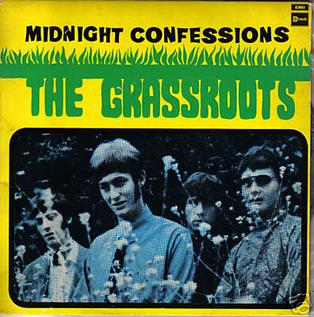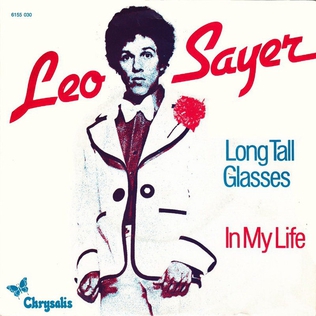
"Love Grows (Where My Rosemary Goes)" is the debut single by Edison Lighthouse. The song reached the number one spot on the UK Singles Chart on the week ending 31 January 1970, where it remained for a total of five weeks. It also became the first number one single of the 1970s (not counting Rolf Harris's "Two Little Boys" which was a holdover from 1969).

"Smokin' in the Boys Room" is a song originally recorded by Brownsville Station in 1973 on their album Yeah!. It reached number 3 in Canada and on the US Billboard Hot 100, and was later certified by the RIAA.

"Saturday Night" is a song recorded by the Scottish pop rock band Bay City Rollers. It was written and produced by Bill Martin and Phil Coulter. The tune is an upbeat rock number with a memorable hook, in which the word "Saturday" is spelled out in a rhythmic, enthusiastic chant.

"Show and Tell" is a popular song written by Jerry Fuller and first recorded by Johnny Mathis in 1972. This original version made it to #36 on the Easy Listening chart.

"Lonely Night (Angel Face)" is a song written by Neil Sedaka. The song was first recorded by Sedaka and appeared as a track on his 1975 studio album, The Hungry Years. The following year the song was made popular when covered by the pop music duo Captain & Tennille, who took their version to number 3 on the Billboard Hot 100.

"Take Me in Your Arms (Rock Me a Little While)" is a song written by the premier Motown songwriting/production team of the 1960s Holland–Dozier–Holland. The first hit recording was sung by Kim Weston in 1965. It was most popular in 1975 when it was recorded by the Doobie Brothers.

"Love Ballad" is a song by R&B/Funk band L.T.D. Jeffrey Osborne is the lead singer.

"Sweet Hitch-Hiker" is a song by the American roots/swamp rock band Creedence Clearwater Revival from their 1972 album Mardi Gras. It was first released as a single in 1971 and reached #6 on the Billboard Hot 100, becoming their 9th and last top 10 hit. On the Record Retailer UK Singles Chart, it peaked at #36.

"Midnight Confessions" is a song written by Lou T. Josie and originally performed by the Ever-Green Blues. American rock band The Grass Roots later made it famous when they released it as a single in 1968. Though never released on any of the group's studio albums, it was on their first compilation album, Golden Grass, and has since been included on many of their other compilations.

"Love Won't Let Me Wait" is a hit 1975 single by Major Harris, a former member of R&B/soul group The Delfonics. Written by Vinnie Barrett and Bobby Eli, the single is considered to be a staple of classic soul playlists, and was Harris' only entry into the top five on both the soul and pop charts. The single hit number five on the pop chart, and also hit number one on the soul chart for one week. Billboard ranked it as the No. 24 song for 1975. It was awarded a gold disc by the R.I.A.A. on 25 June 1975.

"Third Rate Romance" is a song written by Russell Smith, first recorded in Montreal in 1974 by Jesse Winchester and his band the Rhythm Aces, assisted by Smith. It became a hit the following year by the newly re-formed Amazing Rhythm Aces on its 1975 album Stacked Deck. It was the band's debut single, reaching No.11 on the U.S. country singles chart and No.14 on the Billboard Hot 100, as well as No.1 on the Canadian RPM Country Tracks and Top Singles charts.

"Temptation Eyes" is a 1970 hit song by The Grass Roots. It was released on their second compilation album, More Golden Grass.

"I Woke Up in Love This Morning" is a song written by L. Russell Brown and Irwin Levine and recorded by The Partridge Family for their 1971 album, Sound Magazine. It went to number 13 on the Billboard Hot 100 in 1971; it hit number 4 in Canada.

"Doesn't Somebody Want to Be Wanted" is a song written by Mike Appel, Jim Cretecos, and Wes Farrell and was recorded by The Partridge Family for their 1971 album, Up to Date.

"Clap for the Wolfman" is a song written by Burton Cummings, Bill Wallace, and Kurt Winter performed by their band, the Guess Who. The song appeared on their 1974 album, Road Food. The song was ranked #84 on Billboard magazine's Top Hot 100 songs of 1974.

"The Things We Do for Love" is a song by British band 10cc, released as a single in 1976. It later featured on the album Deceptive Bends released in 1977 and was the group's first release after the departure of band members Kevin Godley and Lol Creme.

"Chick-A-Boom " is a song written by Janice Lee Gwin and Linda Martin and performed by Daddy Dewdrop. It was featured on his 1971 album, Daddy Dewdrop. The lyrics in the verses are spoken, rather than sung.

"Sooner or Later" is a 1971 hit song by The Grass Roots. It was released as a single and put on their third compilation album, Their 16 Greatest Hits. It reached number 9 on the US Billboard Hot 100, becoming their third and last top ten hit.

"Long Tall Glasses (I Can Dance)" is a 1974 song by Leo Sayer, co-written with David Courtney. It was released in the United Kingdom in late 1974, becoming Sayer's third hit record on both the British and Irish singles charts and reaching number four in both nations. It was included on Sayer's album Just a Boy.

"One Fine Morning" is the second single released off of Lighthouse's 1971 album, One Fine Morning. The song is one of the band's most successful singles, making the top of the charts in Canada, and becoming their most popular single released in the United States.


















